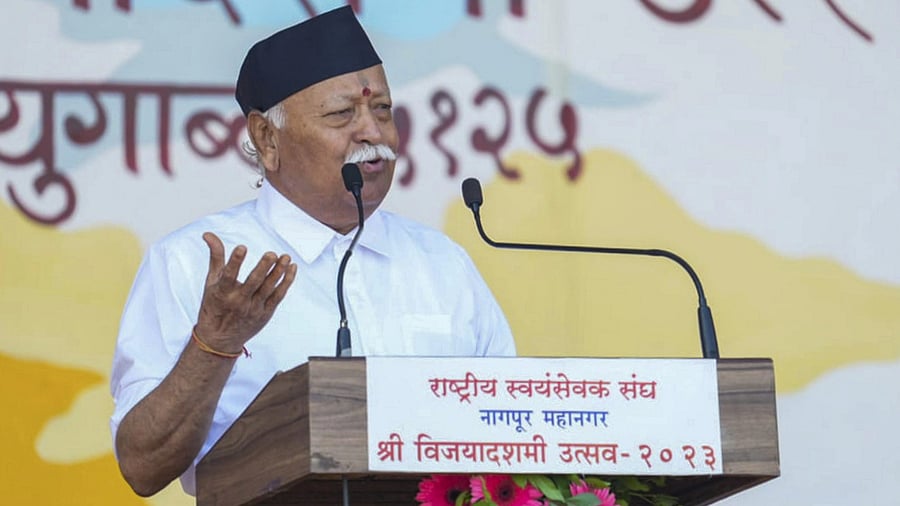
Rashtriya Swayamsevak Sangh (RSS) chief Mohan Bhagwat addresses RSS' 'Vijayadashmi Utsav', in Nagpur.
Credit: PTI Photo
Mumbai: As he dwelled on the ongoing Manipur ethnic violence while addressing a Vijaya Dashami rally in Nagpur, Rashtriya Swayamsevak Sangh chief Mohan Bhagwat wondered whether the “foreign powers” in South-East Asia have a role in the events involving the northeastern Indian state.
Addressing the rally, Bhagwat spoke on a range of geo-political issues involving India and its immediate neighbours.
On Manipur, he said: “If we look at the current situation of Manipur, this fact becomes obvious. How did this mutual discord and hatred suddenly erupt in Manipur, which had been peaceful for almost a decade? Were there extremists from across the border also among those who committed violence? Why, and by whom, was an attempt made to give a communal tinge to this mutual conflict between the Manipuri Meitei and Kuki communities, who were apprehensive about the future of their existence?”.
Deliberating further, he wanted to know which “foreign powers” may be interested in taking advantage of such unrest and instability in Manipur. “Does the geopolitics of South-East Asia also have a role in these events? Despite there being a strong government in the country, on whose strength and instigation has this violence continued unabated for so many days?,” he asked.
“Now, when people on both sides of the conflict are seeking peace, which are these forces that are attempting to trigger hatred and violence by causing an incident as soon as any positive step is being taken in that direction? Multidimensional efforts will be required to solve this grave problem. To resolve this vexed problem, we would need a strong political will, concurrent actions and efficiency,” he said.
On the issue of China and the need for a new perspective on the emerging situation, he said: "We are also long aware of China’s presence on India’s northern border. Therefore, this area has special geological, geo-strategic and geo-political significance. Keeping that in mind, this area will have to be considered from a different perspective.”
About the Himalayan belt, Bhagwat pointed out that it recently witnessed a series of devastating natural disasters from Himachal Pradesh to Uttarakhand to Sikkim. "It is already being feared that these events could be a sign of some serious and massive crisis in the future. This area, which marks out the northern border of India, is critical for the country's border security, water security and environmental health, and must be protected at all cost,” he said.
“We need to consider the Himalayan region in totality by considering this region as a single unit from the standpoints of security, environment, demography and development. This naturally picturesque area is geologically new, still forming, and hence unstable. Arbitrary development plans were implemented without fully understanding the nature and characteristics of its surface, topography, geology, biodiversity and water resources. As a result of this mess, this region and, hence, the entire country is reaching the brink of crisis. We all know that this is the region that supplies water to all the countries of East and South-East Asia, including India,” he said.